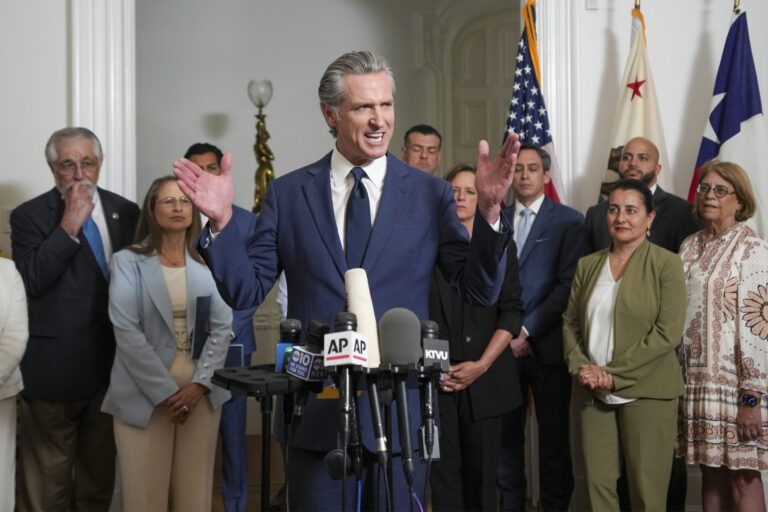Gavin Newsom’s Shift: A Strategic Move Towards the 2028 Presidential Primary
Governor Gavin Newsom of California is rapidly transitioning his political stance, positioning himself for a possible bid in the 2028 presidential election. With recent polling indicating a surge in his favorability, his strategy seems aimed at attracting moderate voters and independents, a pivotal move for the Democratic Party struggling with declining popularity.
Why Newsom’s Shift Matters
According to a recent Newsweek article, the fight for the Democratic nomination in 2028 could redefine the party’s future, particularly as it currently grapples with historically low net favorability. Newsom’s strategic shift to the center is marked by a departure from his previously hard-left policies, aiming to mitigate dissatisfaction among voters disillusioned with both Democrats and MAGA Republicans.
Embracing Fossil Fuels
Recently, Governor Newsom has moderated his staunchly liberal views on energy:
- New Stance on Oil: Amid rising gas prices—predicted to reach $8 per gallon—Newsom has softened his position on fossil fuels. Previously a vocal critic of oil companies for "screwing" consumers, he now recognizes the state’s dependence on oil during what he describes as a necessary energy "transition".
- Press Conference Quote: “We are all the beneficiaries of oil and gas. No one’s naive about that,” Newsom mentioned in a recent press conference, advocating for a pragmatic approach to energy policy.
Legislative Proposals
- Increasing Production: Newsom is currently negotiating within his party to promote a plan for increasing oil production. His proposed draft legislation could bypass current climate regulations, providing a blanket environmental approval for new oil wells aimed at combating shortages caused by refinery closures.
- Impact of Refinery Closures: Major announcements regarding the closure of Phillips 66 in Los Angeles by late 2025 and Valero’s Benicia facility next year have accentuated supply concerns in California, the country’s second-largest gasoline market.
Departure from Progressive Policies
In addition to his energy policy changes, Newsom has also made noteworthy shifts in other areas:
- Immigrant Healthcare: In May, he proposed limits on healthcare coverage for undocumented immigrants due to a growing budget deficit, contrasting sharply from his past advocacy for universal healthcare for all low-income adults, regardless of immigration status.
- Homelessness Initiatives: Newsom is now pushing for decisive action against homeless encampments, proposing strategies for cities to "take back the streets." “No more excuses,” he stated, signaling a move toward aggressive policies uncommon in his earlier administration.
Cross-Party Engagement
In a surprising twist, Newsom has also opened channels to conservative figures:
- Podcast Guests: He has hosted prominent Trump allies like Steve Bannon and Charlie Kirk on his podcast, discussing controversial topics such as restrictions on transgender athletes in women’s sports and calling some police reform calls “lunacy”.
Reactions and Criticism
These policy reversals have drawn sharp criticism. Norman Solomon, the national director for the progressive group RootsAction, accused Newsom of sacrificing core values for political gain: “He is willing to throw basic decency under the 2028 campaign bus,” he remarked.
Navigating Voter Sentiment
As the 2028 Presidential election approaches, Newsom’s adjustments reflect a calculated move to broaden his appeal among Californian voters and beyond. With high gas prices and ongoing debates over immigration and homelessness, his ability to balance progressive ideals with pragmatic governance will be pivotal.
Conclusion
Gavin Newsom’s evolving stance illustrates the tension within the Democratic Party as it faces upcoming challenges. Whether his shift towards moderation can regain vital support or alienate his base remains uncertain, but one thing is clear: the battle for the 2028 nomination will define the party’s trajectory.
For more insights on this political evolution, check out related articles on Democratic strategies and voting trends.


